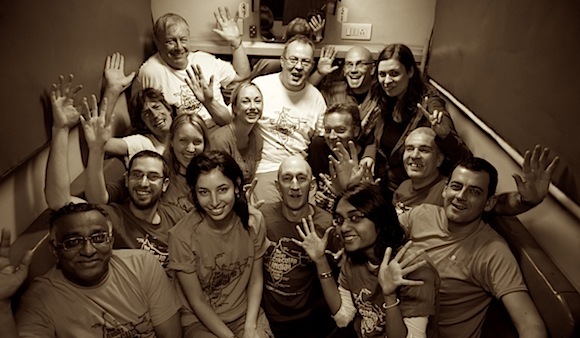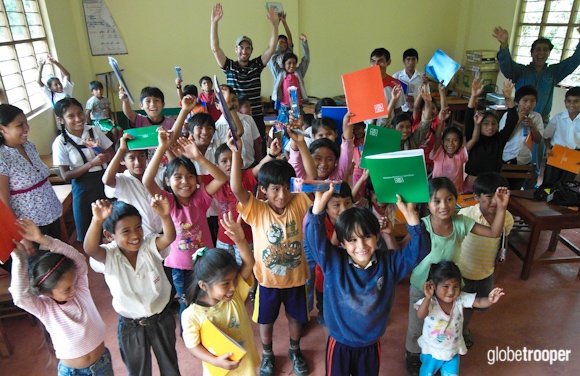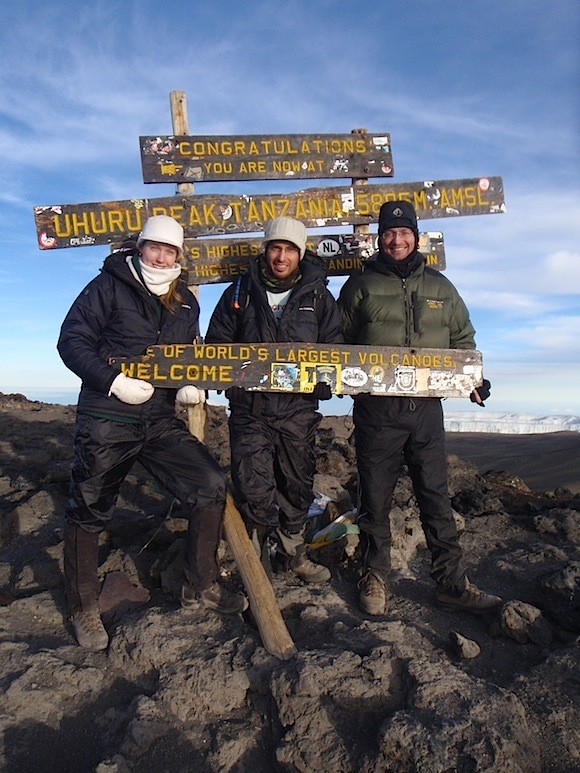Todd & Lauren and left their jobs, not to travel, but to build a business. Since they were building a travel business, it was a great opportunity to test-drive the ‘digital nomad’ lifestyle. So after developing and launching Globetroopers, they left their home in Sydney, Australia, for a life of indefinite work + travel. Ever since, they’ve spent 1-to-3 months in cities all over the globe, living like locals. Please enjoy this typical week-in-the-life of Todd and Lauren (as written by Todd) in Bangalore, India.
This post was originally published in 2011. It has since been updated for accuracy of links and content.
Our life of indefinite work + travel is by no means glamorous. We rarely visit tourist attractions or famous sites; we spend most of the day, every day, including weekends, working on business projects or training for expeditions. Although this sounds boring to short-term travellers, we get to experience other cities as locals and don’t have an expiration date on our trip.
With that said, we do love to travel and we undertake various expeditions throughout the year because we love adventure. Those expeditions are our getaways from working life. But I thought a ‘week-in-the-life’ of our standard week would give a better picture of the reality of long-term travel than a ‘week-in-the-life’ climbing a mountain.
Day One: Sunday
8am – We sit up and start typing madly in response to urgent overnight emails (especially those regarding revenue). It’s early afternoon in Sydney, so it’s a great time to talk with our parents on Skype and get that out of the way for the week ahead. We’ll also have our routine morning muesli while plotting our tasks for the week ahead.
10am – We prepare for the gym, which we visit every day, almost without fail. Normally we prefer to exercise in the great outdoors, but Lauren is only weeks away from her 1000-mile, 2 month trek across Mongolia’s remote Gobi Desert. She needs to train hard to keep up with the other hardcore team members; one who’s summited Everest, one who’s a champion ultra-marathon runner, and the rest who have equally impressive adventure resumes.
12noon to 6pm – We work on different ideas for Globetrooper. Typically we test new features on Sunday. It may be something as simple as fine-tuning the site for SEO purposes, or rebuilding the interface to reduce our bounce rate and make it more compatible with older versions of Internet Explorer (yuk!).
7pm – We cook a local dish, as we do in every city, to minimize costs and live like locals. Admittedly we don’t cook from scratch (we use semi-prepared meals) because, while we love to try foods all over the globe, we’re not so enamoured with food to spend half our day cooking. There are bigger fish to fry, as they say.
8pm onwards – We keep working and then ‘hit the hay’ with our Amazon Kindles, reading our latest books. I’m currently reading Atlas Shrugged and Lauren is reading Walking the Gobi. We love to read all sorts of fiction, and even a little non-fiction, because it goes well with the freedom of long-term travel. When I used to have a ‘real’ career, I’d read fiction as an escape; now, I read it was inspiration of what to do next. Eg. After reading Shantaram, we immediately planned to live in India, which we’re doing now.

Day 2-6: Monday to Friday
8am to 10am – We work, eat breakfast and talk about new ideas for Globetrooper, all simultaneously. At the moment we’re in between major updates, so we’re looking for ways to increase interaction on our website. I’m also trying to decide where I’ll live while Lauren is in Mongolia. I’m choosing between China, South Korea, and Thailand. Most people don’t realize how difficult it is to choose your next destination as a long-term traveller; I wrote about this conundrum in, Can You Ever Have Too Much Freedom? (editor’s note: I also wrote about this agonizing process here, in The Paralysis of Choice!)
10am – Gym as usual. We’re focusing on interval training these days. The type of travel we like is physically demanding, so we have to keep our endurance up. And interval training tends to make us more resilient to lower oxygen at higher altitudes. We do some resistance work; mostly big compound movements like pushups, chin ups, planks, etc. I’ve recently wrote about how high altitude effects the body (The Science Behind Mountain Sickness); I love researching and writing these types of blog posts.
(See also: Staying Healthy on the Road)
12noon to 10pm – Our days are pretty standard around this time. We work on Globetrooper and try to catch up with travel bloggers and other ‘Troopers’ in our area. Even though we don’t frequent tourist attractions, we love to meet fellow travellers and hear their stories.
I also work on blog posts for Globetrooper at some point in the day. I love to blog about anything that requires in-depth research and has some link to travel. For example, I recently spent an entire day researching How To Use Solar Power with a MacBook, which Lauren will do in the Gobi Desert. I’m becoming less and less interested in writing directly about our travel experiences, unless we have a truly unique experience, like our search for untouched civilizations in the Peruvian jungle.

Day Seven: Saturday
9am – We may wake up a little later if we spent last night with local travel bloggers. We also head out for grocery shopping and a few other weekly chores to keep life on the road running smoothly. That may include applying for visas to new countries and replacing our travel gear. We live out of 32-litre backpacks, so our gear wears out fairly quickly. Almost as much as global travel itself, we love that our lives are minimalist enough to live only from the contents of such small backpacks.
11pm – 2pm – Often we meet for brunch or lunch with other travellers. We prefer lunch meetings because we find them more engaging than meeting at night, which tends to include lots of drinking, loud music and relatively less engagement.
3pm onwards – We like to have weekly business meetings to take stock of everything. Life on the road isn’t easy, and it’s especially difficult to financially support ourselves. So we like to regroup, compare data (PayPal revenue, Google Analytics, etc), talk about the future, and make sure we’re still on track with our plans. We also regularly plan new adventures and expeditions, which is a good break from the hectic work of business.
Lauren is already halfway across the Gobi Desert in Mongolia. Todd is homeless, somewhere between China, South Korea and Thailand, where Lauren will meet him after her trek. They’ll likely head to Berlin after that to live for a few months with another entrepreneur. After that: who knows. Such is the beauty of permanent life on the road! Check out Todd and Lauren’s adventures at Globetroopers.



Hey guys
Lovely post, I always enjoy reading a day in the life! I’d be keen to know more about the kind of training you do at gym. Have you written about it in any detail, or are you planning to? Wishing you well on your travels!
Ang 🙂
Another great week in the life, thanks Nora. And I loved learning more about my pals Todd and Lauren. I would also like to know more about how they prepare for adventure and high altitude travel.
Can’t wait to find out about Lauren’s Gobi walk.
Cheers,
Mariellen
It’s really interesting that even a life on the road can develop a sort of routine. I was very impressed that you manage to get to the gym almost everyday even though you’re always moving around. I can see how it’s important to stay in shape will all you do!
Many thanks Nora; it seems so long ago that we were in India 🙂 Life has certainly changed shape. Here in Chiang Mai (Thailand) productivity and training seem to dip because there are so many other travel bloggers here and it’s good fun to catch up.
@angela: we prefer to train outdoors instead of a gym. But there was nowhere to run long distance in Bangalore, and the air pollution was too much at certain times. Mostly, we’re happy to do interval runs and pushups. The interval running might be a slow 7km jog with 200m sprints every 1km. I find I’m much more likely to keep fit if I keep it simple. As soon as I start planning gym routines, it all falls apart 🙂
@mariellen: depending on how high we plan to go, we might live somewhere at high altitude beforehand. At one stage we planned to climb Aconcagua (which fell apart for various reasons), but we lived in Cusco for 3 months (at 3,300m) in preparation. We also stayed in La Paz for a while, which is 3,800m (~12,500ft). Living that high really helps.